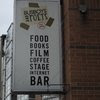Washington – Iraqi-American Anas ‘Andy’ Shallal’s inspiration for uniting communities started when he moved to Washington as an illegal immigrant at age 10.
He left the Arab world during a time of revolution and upheaval – he witnessed the televised killing of his president and the Baath regime takeover – only to enter a country in the midst of major social change in the 1960s.
Shallal recalled the assassinations of civil rights activist Martin Luther King Jr and US president John F Kennedy, the race riots and burning of buildings in Washington.
‘The whole city was in fire. And here we are in the middle of these race riots,’ Shallal, 55, said. ‘We had no idea what was really happening.’
The widespread unrest in Iraq and the United States opened Shallal’s eyes to the volatile parts of the world. For years, he had envisioned a place to connect people from all walks of life and honour contributions of influential world and community leaders.
Also an artist and social activist, he began his dream in 2000 at age 44 with the Peace Cafe, a monthly meeting that brought together Arabs and Jews to discuss the Israeli-Palestinian conflict over dinner.
After decades in the restaurant business, in 2005 Shallal launched Busboys and Poets, a restaurant, bookstore, fair trade market and gathering place where people can discuss issues of social justice and peace. There are now three such restaurants in the Washington area.
The name was inspired by Langston Hughes, an African-American poet who worked as a busboy at the Wardman Park Hotel in the 1930s, before receiving recognition for his writing.
Hundreds of guests – from local residents to celebrities, artists and politicians – flock to Busboys in search of delectable organic cuisine and performances.
Shallal said that as a young man in the US capital he never felt like he belonged, yet he was able to blend in with both white and black groups and hear their gossip about each other.
‘Back then, there was no brown – you were either black or white,’ he recalled.
He described Iraq as ‘a much more homogenous society’ without a history of interracial issues.
‘The separation of the races in this country really became almost an obsession for me,’ Shallal said. Even today he sees a divided, segregated culture in Washington.
‘People tend to not mix very much,’ he said. ‘It’s a city that’s undergoing a lot of changes. It’s a city that is trying to find its identity.’
But he’s doing his best to unite people who live ‘parallel lives,’ as is obvious in the diversity of people – from black to white and all shades in between – at his restaurants.
The road to the first Busboys has been a long one. After graduating from Catholic University in Washington and dropping out of medical school, Shallal waited tables and ‘learned the restaurant business from the ground up.’ He managed other people’s restaurants until opening his first in 1987.
He wanted to combine his passions – theatre, music, poetry, books and food – into one.
‘I wanted a real community place where different types of people with different interests, different backgrounds could all come together and could interact and intersect,’ Shallal said.
The first Busboys in Washington’s U Street corridor, an African- American cultural haven, buzzes with intellectual conversations and soft jazz.
Artists, activists, musicians and playwrights from Howard Zinn and Alice Walker to hip-hop legend Common have performed music and poetry on the velvet-curtained stage. Open-microphone nights invite public participation.
The cozy nook of a bookstore offers works from local writers, and even has a shelf on Haitian literature. The bar serves up organic beer. Prominent politicians such as Hillary Clinton and consumer activist Ralph Nader sometimes sponsor events.
Paintings adorn the lime-green walls depicting people – mostly black women – going about everyday life. Shallal’s own full-wall mural, called the Wall of Peace and Struggle, depicts the faces and words of inspiration of Mother Teresa who started the Missionaries of Charity, Indian independence icon Mahatma Gandhi and former South African president Nelson Mandela – people who ‘have been instrumental in changing the world – in changing how we live today,’ Shallal said.
‘It gives people a sense of hope, a sense of possibilities and a sense of perspective,’ he said. ‘These are people (in the mural) that have given up their lives, some of them, so that others can have peace and freedom.’
For more info about Busboys and Poets visit their website.

